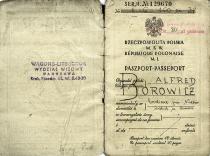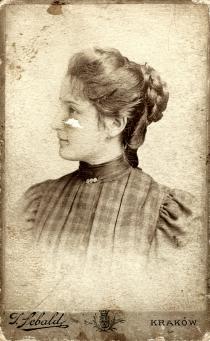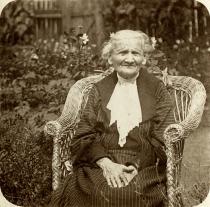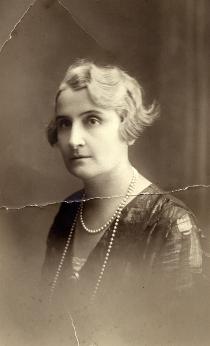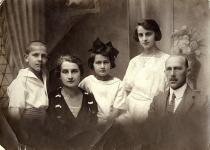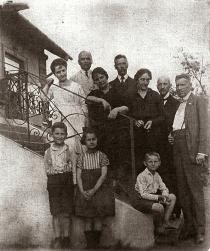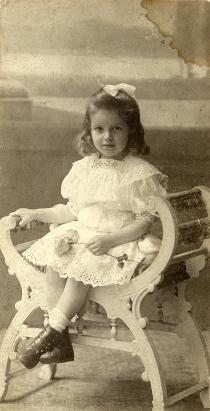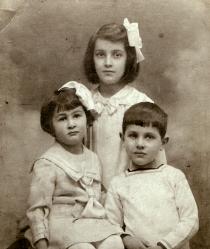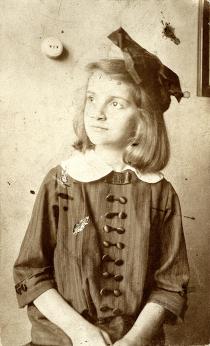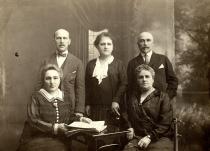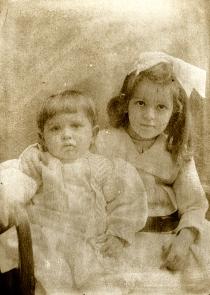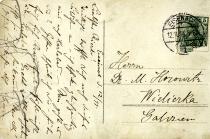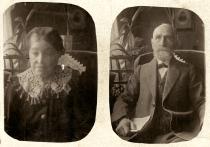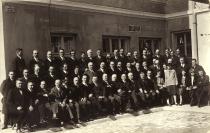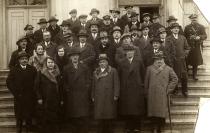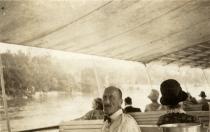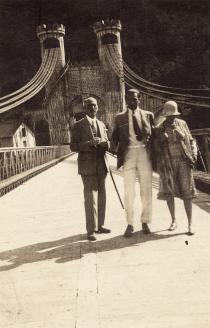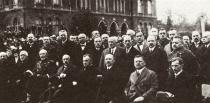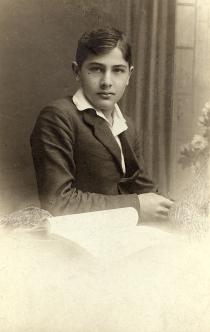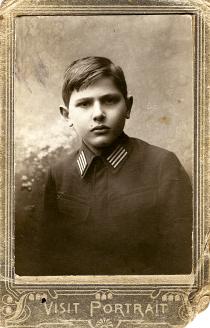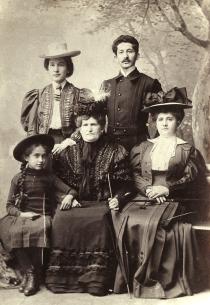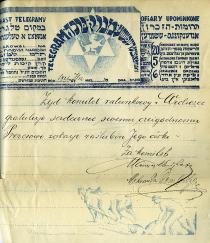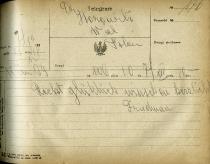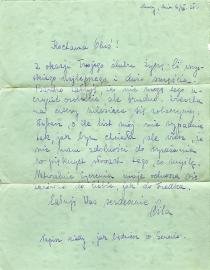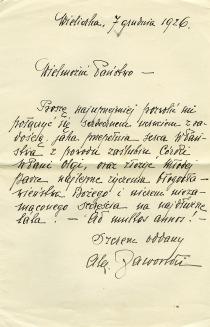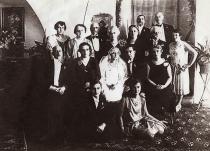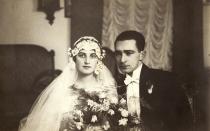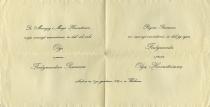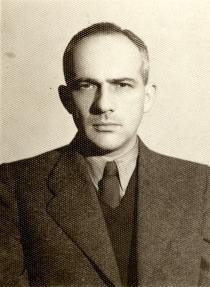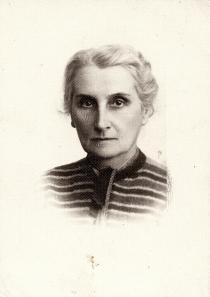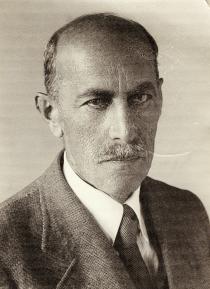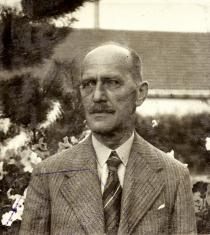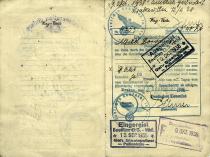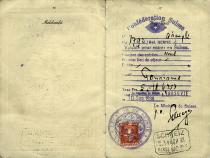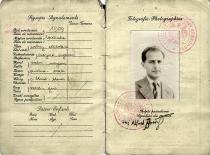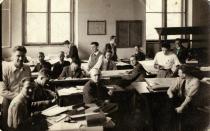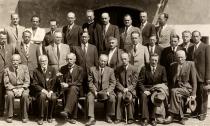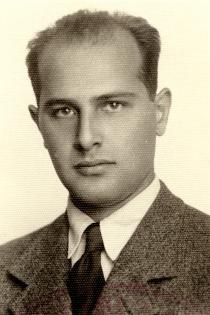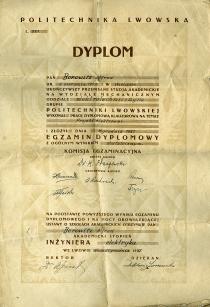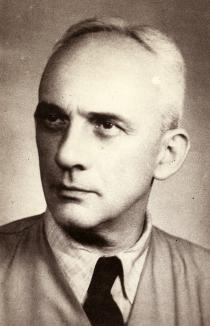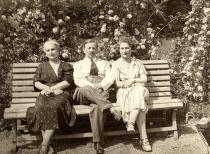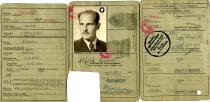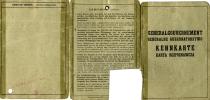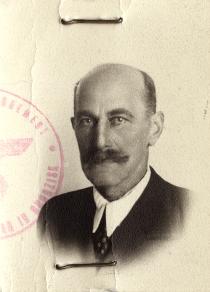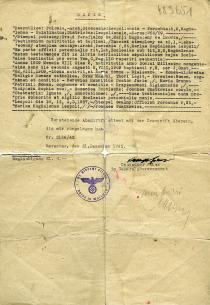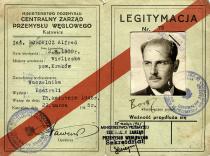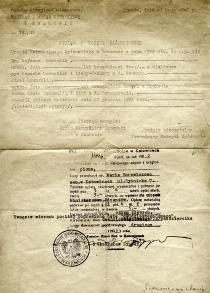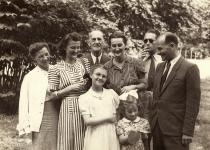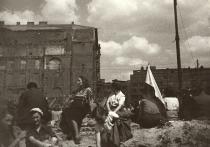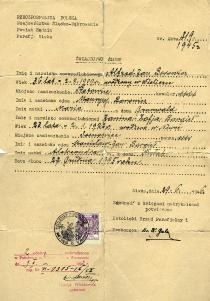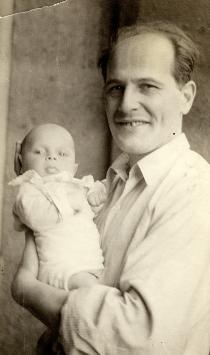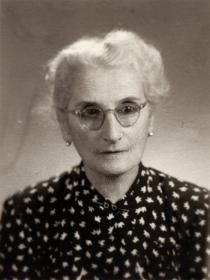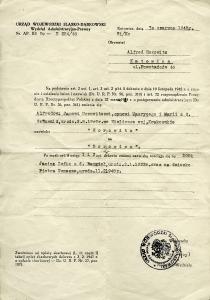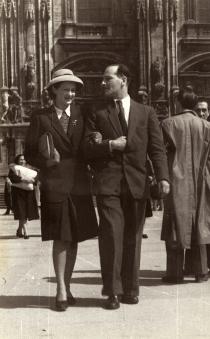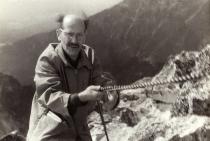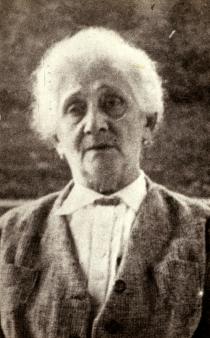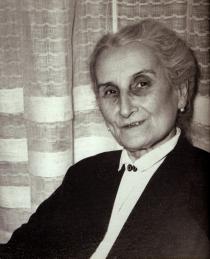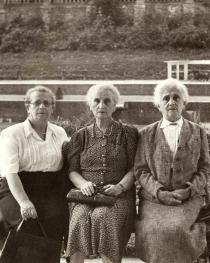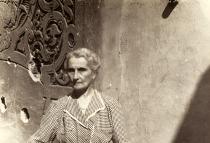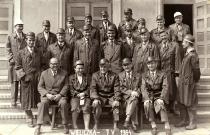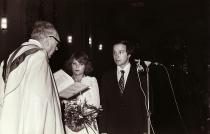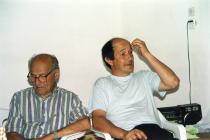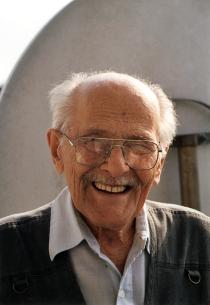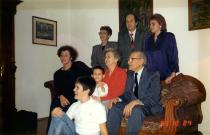
Alfred Borowicz
Warsaw
Poland
Interviewer: Agnieszka Witkowska
Date of interview: March-April 2006
Mr. Borowicz is an extremely nice, 97-year-old gentleman. We met several times in his Warsaw apartment, where he lives with his wife Janina. Mr. Borowicz is a very cheerful and vigorous man. His memory serves him well; he immediately remembers details concerning his pre-war friends and various events from the past. He is also optimistic and curious about the world. A great interlocutor, his story is interesting and full of humor. Mr. Borowicz died a couple of weeks after authorizing this text.
My family background
Growing up
During the war
Post-war
Glossary
I have some very early memories. I was a few years old when this very funny person visited us, about half my height, slightly taller, in a huge hat that I could not hold with my both hands. A whole bunch of kids escorted her [from the train station] because it was a sight that you just didn't see. She came to us and, as soon as the door opened, said, 'Marynia, show me your children.' I fled to the garden, climbed up a tree, an apple tree, to hide, but they pulled me down in no time at all. Our mother lined us up and questions began. It turned out she had been a governess in the house of my mother's parents and knew my mother as a small girl. I don't know how she found us in Wieliczka, but she came to visit us. This is my earliest childhood memory.
In fact, I wasn't interested in family matters at the time but rather in the matters of the garden. We had a very large garden, a lot of fruit in it, beehives, the children had their duties, such as hoeing the paths, weeding, and so on. And we were indeed busy. Besides, we liked the job. And relatives were a frequent sight; the house was large so they stayed overnight.
The grandparents virtually never visited us; we always went to visit them. Both the paternal and the maternal grandparents lived in Cracow. My father's parents lived in the Stradom neighborhood, and my mother's parents on 9 Zyblikiewicza Street. My father was my mother's elder by ten years, and he was the youngest in the family, so his parents were much older than my mother's.
From my father's side, my grandparents were called Horowitz. Grandfather was called Hersz, and my grandmother was Lieba-Jecheta, nee Gronner. Their daughter, Regina, my father's sister, who never married, lived with them. When we visited the grandparents, Grandmother, who was already very old, sat by the window in a kind of elevated armchair, in a jabot, always dressed the same way. She just stroked you on the head, looking at you, and said very little. Grandfather, in turn, walked from one kid to another, talked, asked about everything.
Grandmother ran the house; women didn't have jobs those days. That was 100 years ago, early 19th century. The Horowitzes were probably religious, but I don't know because we never had much to do with it.
I remember how, after the first war, a man came from America; I don't know his name. A whole company escorted him from the train station because he asked about my father. Young, in a white suit; no one dressed white in Europe those days, so he caused a sensation in Wieliczka. It turned out he was the son of the owner of some factory who had emigrated to America before the war. My grandfather worked for that man as a bookkeeper.
From my mother's side, my grandparents were called Karol-Kopel Grünwald and Elzbieta-Elke, nee Schwarzwald. My grandfather was a master builder, well known in Cracow, there were many anecdotes about him because he was witty and fun, built many houses. I have a calendar from 1913 stating the house owners of Cracow, and he is mentioned there several times. Grandmother surely didn't do anything besides running the house. When you have eight children you can hardly have a career. My maternal grandparents weren't religious.
My father was called Mojzesz-Maurycy Horowitz and was a lawyer by profession. He graduated from Jagiellonian University 1 and all his life, since he settled [there] in 1904 after marrying my mother [on 24th December 1904], he was an attorney-at-law in Wieliczka. He ran a private practice. He also had other interests besides law, namely he loved gardening. He took care of that, people were hired for weeding. There was also a caretaker, an ex-miner who lived in a cottage belonging to the garden.
My dad was an elected vice-mayor of Wieliczka. The mayor was a political nominee, and the vice-mayor was elected by the town council, which was also elected. My father was active on the town council for many years. He was in charge of the public utilities: sidewalks, sewage system, waterworks, power system, and so on. Wieliczka had those things before Cracow did. My father occupied various important posts in the town. Also among the Jews. For instance, he ran the health fund for many years. Before the war, each town had its health fund and together they formed a kind of cooperative. There were two health funds in Wieliczka, one for the salt miners, the other for all the other public and private factories running a health insurance plan. In the latter one there was a board, and my father served as the president of that board for fifteen years.
My father wasn't a PPS 2 member before the war, he sympathized with it, but never joined, I suppose. In any case, the PPS held him in high esteem and he was elected [vice-mayor] surely by the PPS's votes. After the war he immediately joined and, as a reward, they transferred him to the PPR 3.
My dad wasn't religious but he went to synagogue on every anniversary of his father's death. I never went to synagogue; only once I did go, as an amateur, so to say, to the 'Tempel' in Cracow, a synagogue built, I suppose, by the B'nai B'rith 4. My father was strongly attached to Jewishness. He read in Hebrew. We buried him at the Jewish cemetery in Cracow, because that was what he wanted. Our whole family was Jewish, we were all Jews. There were also converts in Wieliczka, the Molkners. Molkner was married to a Catholic woman but he met with his relatives regularly, whereas there were also those who preferred to pretend they had never been Jews. Those we ignored.
My mother, Maria Horowitz, nee Grünwald, came from Cracow; her parents had a governess. My mother spoke fluent German and could easily communicate in French. She completed a boarding school. My dad spoke only German and Polish. Mom wasn't religious, I'm sure she couldn't speak Hebrew. Her main activities included running the house, pursuing her cultural interests, entertaining the guests, and playing cards.
She also looked after those poor women. Those were women she knew, poor ones, one was called Escia [diminutive for Estera], another one Ablowa, there were also other ones. They came to my mother with all kinds of businesses. She helped them, gave them things, bought things from them. Escia, for instance, if she got hold of some good quality herring, brought it to us, and my mother said, 'I'll fetch a good price for that for you.' She probably paid her herself, but a better price than the other woman expected.
Our home was an old house at Rynek Glowny [main market square in the town's historical center], right near my gymnasium. The house was old and spacious, two rooms had walls over a meter thick and vaulted ceilings. The house is still there. We had seven rooms, two bathrooms, a kitchen, naturally a larder, an attic, a cellar, and so on, the full program.
We also had neighbors, the Wimers, very religious, they lived in the house next door and for Sukkot they built a booth [sukkah] in the courtyard. They had daughters, who all got married one after another, and each time there were lengthy conferences with my mother about the wedding and the future husband.
The majority of the Jews in Wieliczka were merchants - bigger or smaller ones. But there were also representatives of other trades. There was a sawmill owner, a brickyard owner, a miller. There was also a certain young lawyer, my father's close acquaintance, Doctor Rosenzweig, who married into the Friedman family. I mention his name because his brother was an outstanding engineer with a PhD from Lwow Technical University.
A very talented specialist, he lectured at the university. He died during the war. There were many Jewish stores. On Rynek Glowny there were stationeries, including a Jewish one, run by Gold. Melzer ran a haberdashery; Goldstein sold chemicals, dyes and lime. Who else do I remember? There was a plumber named Lefeholtz, a watchmaker called Konigsberger, and a baker named Handler.
Wieliczka had a population of some 10,000, and quite many of those, three thousand perhaps, were Jews. On Saturdays especially they wore the decorative kalpaks, the long black frock coats, and they very much stood out from the crowd. There was certainly a synagogue in Wieliczka, and there was also a Jewish quarter, called Klasno. That's where the majority of the Jews lived. I suppose if you count Klasno, there were many more Jews than the three thousand I mentioned. It could have been half of the town's population. My father surely knew half of all the Jews in Wieliczka in person.
Sabbath wasn't celebrated in any special way in Wieliczka, but the shops were closed, the Jews probably went to the synagogue, but you didn't see that. We didn't celebrate all the Jewish holidays, though there was always matzah for Pesach. Judgment Day, New Year - those were very solemn days, I mean we didn't do anything special, but you saw that and made sure not to offend anyone. For Judgment Day, for instance, we pretended and didn't eat too ostentatiously. And my mother's friends often came to check. We basically expected such inspections because, in the first room, where you sat, there was always a loaf of bread, a knife, some butter, for the children to come and eat if they wanted. And at that time [during the high holidays], there was nothing.
In fact, we often went to Cracow for those days to avoid offending anyone, avoid dazzling people's eyes. We also observed all the Catholic holidays, the Christmas tree was always there. We didn't observe that as a religious holiday but rather as a ceremonial dinner, to avoid offending people, because we had many Catholic friends as well.
My father was a B'nai B'rith member all the time, but I don't know anything about what he did there. It was a legal organization, officially registered, a charity. I know they built a Jewish hospital, the city's best. I also know that it was an organization for wealthy people, the membership fees were high, and my father borrowed money to pay his dues. They would organize a charity ball, all the members had to be present, and everyone had to make a donation, a huge one, usually. There was a cause, and they said, for instance: 'we are building a hospital, we need so and so many millions, everyone has to contribute 100,000.' In Wieliczka, only my father belonged to the B'nai B'rith.
His brother, Zygmunt, in turn, lived in Cracow and actually sat on the B'nai B'rith board. He was my father's elder by many years. They lived in Skawina at first; he built the railways, railway tracks, train stations, and so on. He had a wife, a Jewess from Vienna, maiden name Sokal. My aunt's first name was Aurelia, Rela. She had to run the whole house because Zygmunt developed a very serious heart condition, quickly went into retirement, stopped working and just strolled about very slowly. They had a daughter and a son. The daughter was called Jadwiga, Heda, she married a certain Beres from Cracow. Their son was called Ludwik.
Zygmunt died during the war, but of natural causes, and Aurelia died long before. Ludwik died during the war; he worked in Gdynia for the Hartwig forwarding company, the Germans came, he died suddenly. Heda survived, emigrated to Israel after 1968 5, and her son Jurek, to Canada.
Aunt Regina, another of my father's sisters, lived with my grandparents. She was very devoted to the family, served everyone. She basically didn't marry because she took care of the grandparents. And of the children in the family. She moved in with Aunt Amalia after the grandparents died.
Amalia lived in Eisenach, Germany, married a certain Seelenfreund. He was a merchant, had a large store on the high street in Eisenach. One of her sons, the eldest one, Bruno, wrote letters to my sister in Geneva, and lived in South America. He got married in Poland, even though he didn't speak a word of Polish. He married a girl named Stella, a cousin of the Unglers, and left with her for South America, where they had a son. Besides that, Amalia had two daughters, one was called Rosie and had two little girls, very beautiful ones, and a husband called Silberstein. He was a German who served in the German army, and when Hitler came to power, he told us, 'They can't do anything to us; I have been awarded the highest military decorations.' But he didn't survive, he was killed, immediately. They were all killed in Eisenach. I know no details.
The eldest of my father's siblings was Aunt Roza, she could have been eight years my father's elder. She married a certain Schefer. He was a big-time merchant, not in Poland but chiefly in China, in Shanghai, Hong Kong. I think he made a fortune there. He bought a lot of furniture, china, and gave it all away to the family; we had beautiful Chinese porcelain and carpets at home in Wieliczka. He also had an incredible post stamp collection, spent tremendous amounts of money on it. Then he gave it to Ludek, Zygmunt's son, as the eldest grandson.
Aunt Roza had one daughter, Malgorzata, or Greta. She married an architect from Cracow, Liebling. Ferdinand Liebling. He built a lot in Cracow, the Jewish hospital and the main post office, among other things. Aunt Roza didn't survive the war. They shot her in bed, at the Lieblings'. And the other Lieblings died too. Theirs was a home of great culture. He spoke virtually all languages, taught me Spanish and English. They were subscribed to various periodicals from all over Europe.
From time to time, the Lieblings held a dinner to which Miss Allen, an English friend of theirs, was invited, and she conducted the dinner the English way. I dropped in there once, by accident, because when I came from Wieliczka I always brought flowers or fruit for the various relatives, and I remember the dinner was attended by several professors from university. My elder sister lived in lodgings at the Lieblings' because she went to gymnasium in Cracow at the time.
My mother had three brothers and four sisters. The eldest sister was called Helena Grünhutowa, nee Grünwald. She married a doctor, Bernard Grünhut, and they lived on Dieslowska [in Cracow]. Doctor Grünhut was a general practitioner, a military doctor, a family doctor, and also a pediatrician. Often, when I visited them, he told me to undress, examined me thoroughly, weighed and measured me, and he kept a file archive of all the children in the family. He was a very well-known doctor, worked for many years, also among the Jewish proletariat in Cracow.
They had one son, Jozef, who became a gynecologist, married Ms. Ehrenpreis. He was rather affluent. The Grünhuts wanted to leave Lwow during the Soviet occupation, but they caught them, sent them to Siberia, of course, into very tough conditions. Janka, Jozef's wife, died there, he survived, joined the Anders Army 6, left the Soviet Union with it and served in the army until the end of the war. Then he settled in England, in London, practiced as a doctor there, and there he died.
Then came another of my mother's sisters, Paulina Szmoszowa, called Pepka at home. Aunt Szmoszowa was the most beautiful one of them all, with beautiful hair and eyes. Her husband was a railway engineer, always with a spade at his side. Marek Szmosz his name was, and he began as a stationmaster in Jaslo, then got promoted to some regional headquarters office.
They had three kids, the eldest one was Stefa, she married Hugo Steinhaus [famous Polish mathematician, creator of the Lwow School of Mathematics], a professor in Lwow. They had one daughter, Lidka, who married Jan Kott [renowned post-war literary scholar, expert on Shakespeare].
Then was the Szmoszes' second daughter, Helena. She studied, chiefly Latin, knew it better than Polish. She married an oil refinery director, Dittersdorf. They were killed in France during the war. They had one daughter, Anita, who survived and is still alive; she's a doctor, an ophthalmologist, and a lay nun. The Steinhauses also survived, he [Hugo Steinhaus] was a professor in Wroclaw after the war. Stefa died in America. She went there to visit her daughter Lidka, stayed there and died in a tragic accident: She set herself ablaze.
Paulina also had a son, Adolf Szmosz, or Dolek. He was a talented engineer, had a degree from Lwow Technical University and before the war worked at the Zgoda steel plant, owned by the Wspolnota Interesow [cooperative]. It was a very large factory, manufacturing the largest and best machines in Poland at the time.
Another of my mother's sisters was Anda Altendorf, who never worked, just studied, almost all her life. She also took care of the house and children. She had two kids, Tadek and Wanda. Her husband, Szymon Altendorf, was a renowned attorney in Cracow. In fact, the family spoke sneeringly about him, believing him to be corrupt. Anda was an eccentric, quarreled with her family, had great expectations. She didn't know how to run the house properly, one day the dinner was served at 5pm, on another at twelve noon, and yet on another not at all.
They all survived the war. Anda reportedly joined an order, was a servant there. Her husband had normal looks and walked the streets [as opposed to hiding], and the kids survived on false papers, Tadek somewhere near Warsaw, in Konstancin or Milanowek. He was an architect. Wanda was an art historian, an associate professor at Cracow University after the war.
Then came my mother and her twin sister, Dana. My mother's name was stated as Miriam in her birth certificate and as Maria in all other documents. So my mother had a twin sister, Danuta. They were very fond of each other, met very often. Dana married one Jozef Klipper. He was a chemist from Bielsko, graduate of the Berlin Technical University. He spoke fluent German, while his Polish was accented and sounded slightly false. He was an executive in the oil industry, made a career there, served as chief executive at the refinery in Jaslo, then in Czechowice-Dziedzice, and finally in Jedlicze. He actually built the Jedlicze refinery for the pre-war Polish government.
Dana was a rich man's wife, didn't even care too much about running the house, had many servants, in Jedlicze: a driver, a gardener, and a footman. At dinner parties the footman served food, sometimes giving me instructions: for instance, when asparagus was served, he told me it was alright to eat it with my fingers.
Dana had a daughter, Lila, my age, she was born in June, I in August. She lived in lodgings in Cracow for some time, but then her mother rented an apartment for her, several bedrooms at Matejki Square. Then they built a beautiful house at Sienkiewicza in Cracow, a villa with a garden, designed by an architect from Vienna. Lila often traveled abroad, then she went to a high school in Switzerland, and she spoke fluent French.
On top of that my mother had three brothers. The eldest one was Roman, the wealthiest in the family, a bachelor, I don't know about his learned profession, but he was certainly educated because my grandfather wouldn't have allowed otherwise. He had a very large painting collection, lived in Cracow at the Market Square between Grodzka and Wislna [streets], in a nice house. He occupied the first floor there, and the walls in all the rooms were filled with paintings from ceiling to floor. He was also the honorary consul of Yugoslavia.
Roman survived the war in poverty in Praga in Warsaw. I met him in Warsaw by chance towards the end of the war and he was very happy to learn that my mother was still alive. There was a wartime rule that you never gave your address to anyone, so we only arranged to meet somewhere in a week or two. Then we stopped meeting because I joined the partisans. Then the war ended, and I learned that he had lived in Praga and died there, reportedly, a day before the end of the war. He had very nice, noble looks, only his nose was terribly Jewish.
Wilhelm, my mother's second brother, was a glazier. He studied medicine, didn't finish it, and my grandfather never forgave him that. He married a wonderful person, Aunt Polda [Leopolda], with whom he had two children. Aunt Polda survived, and Wilhelm, my mother's brother, died long before the war.
Their son Rysiek [Ryszard], one year my junior, was an architect with a degree from Gdansk Technical University, a great drawing and painting talent. A great builder, also a furniture designer. He was taken by the Germans from his home during the war, for reasons unknown. There was a period when he was being blackmailed in Warsaw, but then they let go, and he survived. I doubt whether the arrest was connected with his Jewish origin, perhaps someone informed on him because he was also involved in the AK 7; some paratrooper sent from London even lived at his place for some time.
Rysiek had a sister, Karolina, we called her Lola. She was the family laughing stock. She played beautifully on the piano and studied with great pianists, but we were all musically-impaired so we laughed at her. She wore glasses but still she was very popular with men, liked and valued by every coterie. She married a very handsome and charming laryngologist, Doctor Edward Machauf from Cracow. Then the marriage underwent some sort of crisis and they split.
When the war broke out, they happened upon each other again and decided it was a sign from God. It was the war, you had to stick together, so they became a couple again. She had a son called Jas. He graduated from Cracow Technical University, married a very nice, beautiful girl from Cracow, and after 1968 they emigrated to Australia. Lola and her husband also went to Australia, and both died there, first Edziu [Edward], then Lola.
That leaves us my mother's youngest brother, Leon. A bachelor all the way, a man of honor. My grandfather sent him for technical studies to Vienna. But instead of physics Leon was interested in honorary matters, duels, that sort of thing. He either dueled or stood as a second. Then, because he didn't make much progress in his studies, my grandfather brought him back from there. Fortunately, the war began, Leon immediately joined the Legions 8 and was a legionnaire under Pilsudski 9. He set off from Cracow and spent some time in Maramarossziget Fortress [where the legionnaires were interned; present-day Sighetu Marmatiei, Romania].
When World War II broke out, Leon fled to Lwow. The Ruskies [Russians] were there and because they persecuted ex-legionnaires, he got a job as a night watchman. At night they didn't harass him. When the Germans came, some friend of his arrived with a complete set of false papers, but Leon didn't want to live under a false name and they killed him. He could have survived easily, he didn't look like a Jew at all.
I was born in Wieliczka on 2nd August 1909. When I was a kid, Wieliczka was a large town. You went to Cracow by carriage, which was time-consuming and expensive, or by train. You had to walk to the station, which was some two kilometers from home, board the train, get off in Biezanow, and change there for a long-distance train from Lwow or Rzeszow.
I had two sisters: Olga was the elder one, and Irena the younger one. Irena was two years my junior, and Olga was four years my senior. Olga was born on 29th September 1905 and Irena on 25th March 1911. We were all born in Wieliczka.
We had housemaids, usually two of them. One of them was Kasia, a maid from my childhood who at some point got married, but still took care of the children. Then her sister started working for us, Anielcia Puterowna. Both were treated well, like family members rather than on a master-servant basis.
My school stood near our house, a boys' gymnasium at the market square. My class tutor was Stefan Chmiel who taught geography and history. Biology was taught by Marian Lech. Then came Tomasz Zywiec, the Latin teacher, a wonderful, very likeable gentleman of great culture, the town's elected vice-mayor. Another one was Stanislaw Klimczyk, the Polish literature teacher, with a long mustache, then Kaszycki, the chemistry teacher, and Pichor, the physics teacher, who was very strict, very demanding. Then there was Krynski, a great math teacher, who expressed himself very clearly and tested our knowledge very thoroughly, but still was very popular. And then there was Jurczynski, the French teacher, who was nicknamed 'Kanapa'.
As far as religion is concerned, I had it good because there were no Jewish religion classes, there were very few Jewish students, it didn't make sense financially, and the headmaster said that those Jewish students who wanted to study religion could do so in Cracow. And as I had neither the time nor the desire to do it, I said I wouldn't attend religion classes at all. The class representative suggested I should state myself as a person of no denomination. The headmaster said I couldn't do that on my own, my father had to give his consent. My father came to the school and said that, of course, he agreed. When it was time for the Catholic religion class, I simply left the classroom. And everything was in order.
But the priest always held a grudge against me and, come eighth grade, he came to me and said that schools in Poland were denominational and I couldn't be a no-denomination student in gymnasium, that I wouldn't be able to take the high school finals because I had no grade in religion. The headmaster arranged it with the board of education that I would take a religion exam as part of the finals, but the school had no Jewish religion teacher. The headmaster had a discussion with my father and chose Mr. Szapiro, who was a kahal official in charge of the registers. The board of education agreed and Szapiro was to give me a test in religion.
Everything was alright, the only problem was that I didn't really know anything. I went to Szapiro, and he says, 'you have to learn the entire gymnasium course.' And I didn't do anything. Before the finals I went to him and told him, 'Professor Szapiro, I know very little, please tell me briefly what kind of things I am likely to be asked about.' In the end he gave me three or four things to go through. I did and I learned them by heart.
I can say I had many friends at school. I was close friends with Janek Mucha; we went to elementary school together and to gymnasium as well. His father was a town hall official. But he died and Janek, already as a young lad, worked to support his mother. I was very close friends with him, my wife actually knows him, he competed with me. Another classmate and friend was Edek Fryt, a good student, especially in Polish, he and I wrote essays for the poor ones. I was also friends with Zygmunt Major, Tadek Ziarko and Wladek Wojtowicz.
There weren't many Jewish students in my gymnasium. There was one, Julek Hirsch, son of the Wieliczka veterinarian. We weren't close friends but we were on good terms. Another was Baruch Frenkiel, called Bubek. He wasn't a normal student because his father was religious and didn't allow him to go to school on Saturday, which the school didn't agree to. So Bubek went to school Monday to Friday and each year had to take extramural exams in all subjects. But he passed those, and with excellent grades.
What did we do in our free time? Did we go anywhere? We did, of course! Usually to the park - above all to the sports field. It was out of town and we often went there. I wanted to join the boy scouts but they didn't admit me. They didn't admit Jews. I became an active mountaineer instead. I had this friend from Wieliczka, Tadeusz Pelc, a year my senior, the son of a Wieliczka pharmacist, later he became a pharmacist himself. Every year, we went together to climb in the Tatra Mountains. My parents didn't like that. They worried about me. They had nothing against me going to Zakopane to stay there, but they didn't want me to climb. They tried to control me by reducing my budget, but we put food aside all year and took it with us.
Later we were admitted to the Polish Mountaineering Association but we weren't any big-time climbers. Of course, we had a rope and climbed rope routes, but rather the easier ones. Once we were on the Czech [Slovak] side with Tadek and were returning to Zakopane. We hurried to spend the night in the lodge in the Hala Gasienicowa alp where we had booked beds. It was afternoon, under the Zawrat, we see a trekking party, only boys. We tell them, 'It's late, don't go.' 'No, no, the Zawrat's easy' - the leader says - 'and we are from Bedzin, from Szomr' [see Hashomer Hatzair] 10. A Jewish group.
We went our way. In the middle of the night the lodge manager wakes us up and says there's been an accident on the Zawrat. We decided to go there. We arrived and one of those boys is dead. It was the same group that we had met before. We gave one of those guys a piggyback, took several of the stronger ones with us and went down with them to Gasienicowa. There we fetched a bamboo stick with a net hammock for saving people and went back to the Zawrat. Tadek said the dead guy couldn't be touched before the police saw him. We took the manager down with us and the three or four remaining boys.
When we arrived at the lodge, the head of the mountaineering association was already there, his deputy, and the local police chief. And the head of the alpinists says, 'As a reward, you are awarded honorary membership in the PTT, the Polish Mountaineering Association. Any time you come to Zakopane, you report your arrival and you can sleep for free in all the lodges.'
For the summer vacation we never went anywhere, except to the grandparents. To Cracow you went all the time, almost daily, the parents I mean, not us, though it wasn't so easy to get there, as the train station was out of town. That only changed when the Wieliczka-Rynek railway station was opened, or even before that, when a regular bus line was introduced.
And so the high school finals came. Above all, that year things in school were tough. Half my class wasn't admitted to take the exam. I was an outstanding student in Polish and should have been exempted from the exam but I made some mistake in the written essay and had to take an oral one. You were supposed to state your reading list and I submitted a list of like a hundred titles, because I really read a lot. I listed all the books I had read, and my Polish teacher goes, 'I don't know these books, who on earth is Maeterlinck?' In the end, I passed the finals, with an honorable mention in Polish. [Maeterlinck, Maurice (1862 - 1949): Belgian playwright, poet and essayist who wrote in French, important figure of the Symbolist movement. In 1911 he was awarded the Nobel Prize in Literature.]
During the religion exam Szapiro asks me to list the Jewish holidays, so I go, well, the New Year... 'Hey, hey, in Hebrew.' 'Okay,' I go, 'Yom Kippur...' He says, 'Okay, now read me from this,' and gives me a book in Hebrew. And I have no idea! I hadn't arranged that with him and he was convinced I could read Hebrew. I think he assumed that I prayed, but at this point the presiding teacher cuts in and says, 'I think that's enough,' and I was through. That was in 1926.
I went to university in 1926, but in Czechoslovakia. I was admitted to Brno Technical University after I had been turned down at Lwow University because of the numerus clausus 11: they wouldn't admit me because I was a Jew. There were many students from Brno in Poland, almost all of them Jews. Jews of all hues, many communists, Zionists, and such as myself, raised in Polish culture, there were like three from Warsaw and like four from Cracow.
In my third year I had my first official exam. I went to Lwow but there they told me to start everything from the beginning, even though they recognized some of the exams I had taken in Brno. In Lwow, my schoolmate from gymnasium, Jan Gustkowicz, was a curate at the Maria Magdalena church. The church stood on Sapiehy Street and the building next door was the university. I went to him whenever anti-Semitic riots started and classes were interrupted. We'd play chess.
During the summer breaks I worked as an apprentice at various factories. On top of that, I worked for over a year in a foundry in Glinik Mariampolski near Jedlicze. There was a master carpenter there, a Czech. I spoke fluent Czech, so we talked a lot. I felt comfortable there, and he qualified me as a journeyman. I completed my studies in 1936. I have a genuine diploma, my only document from before the war.
After completing my studies I started looking for a job, couldn't find any for a long time, and finally I got a rather poorly paid job. There was this company, wiring services in Cracow, but they also worked in the Silesia area. They got a contract installing elevators and I was to supervise that. They paid me little, namely they reimbursed me the cost of getting from Wieliczka to Cracow and then to Katowice by train, plus a very modest daily allowance in Katowice.
I didn't work there long but it was through them that I finally got a decent job. Wspolnota Interesow, the Silesian company, which ran the Zgoda plant, bought a disused steel plant in Cracow. The plant had its own power plant in Borek Falecki [Cracow suburb south-west of the city], which provided power to the Solvay sodium plant and some houses in the neighborhood. The diesel engines in the power plant didn't work. They asked the company I was working for whether they wouldn't repair them. They said that wasn't their specialization, but that they had this young engineer whom they could send, and if he agreed to do it, so be it. And so I agreed to repair the engines and got a job as the chief technician at the power plant. That was my last job before the war. It was 1939 and you already felt war was coming. Only we believed in Poland's power. We thought we'd beat the Germans easily.
During the first days of the war [WWII] I was at the plant in Cracow. My younger sister [Irena] went with her child for a vacation to Skole [summer resort about 100 km south of Lwow]. When the war broke out, my brother-in- law was working in Cracow. He told me Cracow wasn't safe, that he couldn't leave Irka [diminutive for Irena] alone, and together with my parents and Aunt Dana went to Skole. I stayed. I only took a whole drawer of cigarettes -my father smoked - with me, went to my friend Adek Krzanowski, and I tell him, Adek, give me a lift to the plant [to Cracow]. I took some stuff, packed a pair of shoes, some clothes and underwear into a suitcase and off we went.
Halfway we meet a flock of people heading towards Cracow. It was the 3rd or 4th of September. Adek said he couldn't drive any further, turned around and rode back to Wieliczka with that suitcase of mine. I'm telling you about the suitcase because I got it back after the war! But the best part were the shoes. I took two right ones from two different pairs, but my mother flipped the sole over and there was a right one and a left one. That's what I wore after the war.
I eventually reached the plant. There's a phone call, and someone says, 'Horowitz, leave everything, lock it up, and go east where you'll be mobilized.' Well, I think, what can I do, Wieliczka is east of Cracow, I'm going there. In Wieliczka I met my friend Zygmunt Grochal and classmate Julek Hirsch with his wife. Grochal says, 'Listen, I came here from Zaolzie [area some 80 km south-west of Cracow], there are Germans everywhere, they'll be here soon, we've got to get out of here.' We decided to go together and we reached Niepolomice [town 12 km north-east of Wieliczka]. It's late evening and Jurek says, 'I know a doctor here, he'll put us up for the night.' We arrive there, the dinner's set on the table, nobody home. I go out, ask someone where they are. 'What do you mean? They've run away...'
We arrived at, I think, Tarnow when Julek Hirsch's wife said she didn't want to go any further. They stayed behind while Zygmunt Grochal and I got as far as Zdolbunow [180 km north-east of Lwow], the former Soviet border. The road was okay, crowds of people were heading in the same direction. We saw the military, but there was no mobilization, they didn't even want to look at us.
Near Zdolbunow we got separated. Zygmunt was digging one trench, I was digging another, there was an air-raid and we lost sight of each other. I went to the field to pick some tobacco; that was right near the border with the Soviets, I look, some strange soldiers are coming. I saw the first Soviet truck that passed the Polish border. It was precisely 17th September 12. The Soviet soldiers went to the police station, I also went there and I was there when they talked to the policemen. 'You'll have freedom now, they told them, you don't need guns, we'll give you everything you need.' Their job was to spread propaganda. It was very primitive. They said everything in Russia was really huge, and if you asked them whether oranges were grown in Russia, they confirmed.
Then I went towards Lwow, joined some soldiers on the way, they asked me to recon for them. At some point I saw Russian tanks. They stopped us and said we'd be allowed to continue on our way but for now we had to wait. I look and see there's a soldier with a bayonet guarding us. I kept in a group with some pilots and they say, 'we've got to split from here.' The soldier guarding us comes up and asks me what I'm doing. I saw some bicycles heaped up on the ground, and I tell him, 'I've lost my bike.' He says, 'well, take one.' I did, and a moment later one of the pilots did the same, but he was in uniform. The Russian asks him what kind of uniform is this, and the guy says he works for the railroads. Four of us took those bikes and together we pedaled away to Lwow.
In Lwow I went to the deserted factory where my fellow student from the university, Halpern, used to work. I took care of it, the Soviets came, nationalized everything, I was appointed the head of the plant. It was a lamp factory. Everything went really well, the factory got big. The Soviets valued those lamps greatly; it was the eighth wonder of the world for them. I worked there until the end [until June 1941 when the Germans came].
At some point the Soviets started the so-called passportization, people were being issued Soviet passports. Whoever couldn't prove to be a local was classified as a refugee and a potential spy. Such people were forbidden by law from living closer than 1,000 kilometers to the state border. Consequently, they were sent to Siberia.
Your ID bore the stamp identifying you as a 'paragraph 16' which meant you were slated for deportation. To avoid that, you had to prove you were a local, that is, have a permanent address there and an ID or a birth certificate from there. The address I had from my student years. I went to the ladies where I had lived in lodgings as a student and they gladly took me in. My ID and birth certificate, in turn, were from Wieliczka. They had classified me as a refugee 17. I went to Gustkowicz [the friend working as curate at the Maria Magdalena church], and he says, 'listen, I shouldn't really give you a false birth certificate because I'm a state official, but this is not any authority for me, it's an occupation, so I have no scruples.' And I got the certificate.
Then I decided to leave the factory in Lwow and I went to join my parents in Skole. And there the Jewish business began when the Germans came. There was no separate ghetto in Skole but they set up a Judenrat 14 and a labor camp. They put me there, of course. On their departure, the Soviets blew up the bridge, and the Germans decided to rebuild it because it was the route to Slovakia. I was an electrician. I spoke German, so they appointed me the interpreter.
Then they set up another camp, for French POWs who escaped and got caught. They were sent to work. I was made the interpreter there too. That wasn't so good because I was too much in sight. From time to time the Gestapo arrived and took people to do away with them. When they arrived, I usually put on spiked boots and climbed up a pole to repair something.
Most people lived in the camp but some lived outside and only came to work. I was allowed to live with my parents, so at least I ate something. People were really hungry, all stores were closed. The only food you could get was ordinary grain, not even flour but groats, and only in return for things. We got rid of almost everything we had. There was no money, the Soviet money was invalid, the Polish money had long been invalid, and the German money was not in circulation.
We lived at a doctor's, his name was Doctor Sokal, all the tenants were Jews. The Germans went from home to home and, through the Judenrat, took things from people, one time it was jewelry, another time it was radios, yet another it was fur coats. They threw people out of their homes and took the better ones for themselves. The head of the Judenrat in Skole was Doctor Rares. There were many Jews there, some educated ones: lawyers, doctors.
The grave situation ended thanks to my younger sister. One day Irka said we couldn't live like that anymore and went to look for help. She went to Warsaw where her husband's aunt, Mrs. Oberlederowa, lived. The Oberleders had purchased false papers in the name Piekarzewski. They had a friend there, Mrs. Ratomska, who helped Jews. Irka said she wanted such papers too and bought papers for herself and her daughter. And went there with Zosia [her daughter]. Then she bought Aryan papers for our mother in the name Sawicka, and for our father in the name Matusiewicz. My mother decided to go to Warsaw to join Irka but my father said he wouldn't go on false papers no matter what, and he stayed in Skole with me.
Before that happened, I worked at the camp. The head of the camp was a German called Schaufelberger, an organist by profession, quite a brute. I was his interpreter, he quite liked me but I had some trying experiences with him. [For instance] I had furuncles on my neck and he said he'd cure me. He took a stick and started hitting me until all those furuncles burst. In fact, he kept telling me I wouldn't make it.
Once freight cars arrived and the Germans took Jews from the town to the station and killed them by the tracks. And once he told me, listen, there'll be a razzia today, you've got to hide. And I was thinking about where to hide. Some time earlier I did a job for him because he had a deer's antlers and he wanted me, as an electrician, to make a lamp out of it for him. I did and he was delighted. And as I did that in his shed, I thought it was a place where they wouldn't be looking. In the evening, when there was less people because you weren't allowed to be outside [because of the curfew], I took my parents and we went to hide in that shed.
And indeed, some time later [Mr. Borowicz does not remember the year, only that it was in the summer], after my mother had fled to Warsaw, a horrible razzia took place. It was quite a distance but I saw horrible things, babies being smashed against the freight cars' walls. It went on for two days, I think. The conditions in that shed were terrible, it was cramped, you couldn't move. My mother sat on a wasps' nest, they stung her like hell. He [Schaufelberger] later asked me how I had managed to survive. I told him, 'you'll be surprised but it was in your tool shed.' And then he tells me it wasn't the last action. I tell him I can't leave because my father doesn't want to. One evening Schaufelberger arrives at my home. He says, 'Take me to your father.' I took him to my father, who spoke German, of course. The German asks him whether he doesn't feel sorry for me being stuck in this place. And in the end my father agreed to go.
I went to the truck drivers. One of them said he had a run to Stryj [40 km north-east of Skole] that day, carrying barrels. Some of the barrels were full, some were empty. He put aside two empty barrels for us, my father hid under one, me under the other. On the way the Germans stop the truck: some policemen and my German, Schaufelberger. They looked, felt around the barrels, but found nothing. And to this day I don't know what he did there. In Stryj we bought train tickets to Lwow. In Lwow I headed right for my former plant. We spent the night there.
On the next day we set off to Warsaw. On our way, in the train, we had this story. The conductor says, 'Mr. Horowitz, sir, I'm so happy to see you.' Suddenly he remembered, and he says, my God, what are you doing here. My father says, what can we do, we've got to go. Okay, but it's dangerous, come with me. And he took us to his compartment at the beginning of the train, where we safely spent the whole journey.
In Warsaw we went to a kind of night shelter. They gave us a room and beds. In the morning I called my brother-in-law. He said, I live in Milanowek [residential area 30 km south-west of Warsaw, today a Warsaw suburb] come here. But, he says, Horowitz it can't be because it's a Jewish surname. So I altered the 'H' to look like a 'B' and the 't' to look like a 'c' and Horowitz turned into Borowicz. Then I went to a notary public, made a certified copy and when I applied for the Kennkarte 15, it looked okay. The idea was simple because I had a professor named Borowicz at university, later he actually became a Volksdeutscher 16.
We went to Milanowek [to move in with the brother-in-law] and started living a normal life. I started looking for a new place to stay and a job. First I moved in with Julek Rutkowski, my friend's brother, on Noakowskiego Street in Warsaw. Julek worked as a builder, out of Warsaw. Then he moved out of the apartment at Noakowskiego because he got married.
I started to work because I got a job in Wilanow [suburb south-east of the city, part of Warsaw today]: a job at a German company setting up a replacement part plant for the air force. They moved into an elementary school in Wilanow and started bringing all kinds of machine tools there. Besides working, I led a social life. The apartment at 18 Noakowskiego Street where I now lived probably used to be owned by Jews. A large apartment on the sixth floor was occupied by a court judge from Bydgoszcz, expelled by the Germans from the city with his wife. They set up in Warsaw and rented rooms. I rented one, the other was rented to someone I didn't know.
My landlords played bridge, but to play bridge you need four persons. There was the two of them, I was the third one, and the fourth one from the other room didn't count at all. So they looked for a partner. Next door lived a Mr. Gierlecki, roughly my age, who played bridge too. He came, we played, and then it turned out Gierlecki held bridge evenings himself and invited first my host and myself, and then only myself. It turned out Gierlecki was an officer and his bridge partners were officers too, and quite high- ranking. Then it turned out they were all AK officers, they pulled me in, I was sworn in. My code name was Borowka.
The AK had all kinds of secret passageways and hiding places and one such hiding place was set up at 18 Noakowskiego. There were beautiful wooden floors there, parquet floors made up of square elements. One such element was cut out, there were planks underneath, a hole was made and a latch lock installed with a pin. You pushed the pin in and the lock snapped open. A set of maps was hidden there. I'm telling you about it because I later went through a Gestapo search there.
One day I came back home after the curfew. I rang the bell at the gate, the janitor opens with a man in an oilskin coat, so I saw he was a Gestapo man. I enter, cross the courtyard, ride the elevator but the neighbors are giving me signs there's Gestapo in my apartment, waiting for me. So I ride down to the basement, and the basements between the individual houses were connected. I got across to the house next door and went out into the street, but it was the night, long after curfew. I had to go somewhere. I went to Marszalkowska, to an acquaintance of mine, they called him the 'president.' It was a house where like six Jews lived [in hiding]. I spent the night there. My room was searched but they didn't find the maps. They only found some underground newspapers.
I'm telling you about those basements because that was a task I had been charged with by the AK for the Warsaw Uprising 17, to make sure passageways were made between basements, and I was in charge of that. And why me? There was an air raid and the roofed markets on Koszykowa were burning, and our house, which adjoined those markets from the back, caught fire too. An alarm was raised: all men to the roof. A whole company went with me to fight the fire but the higher we climbed, the fewer of us there were. I was left almost alone but I extinguished the fire and became a hero, they elected me the house leader, and that's when I made those passageways between the basements.
But there was also an earlier story, from the period when I worked in Wilanow. The wage was low so I tried to deal some, someone gave me a watch to sell, I went to a jeweler to price it, and, bad luck, there's a roundup. I decided to run. I hopped on a tram, but the tram had to stop and they pulled me out. One of them beat me hard on the head with a gun. And pushed me into a 'droshky.' On my way I destroyed the papers that I had in my pockets. I made a real mess there.
At some point the German, or actually I don't know whether he was a German or a Pole, said, 'And maybe he's a Jew?' The other one, a Pole, said, 'let's check.' We went into a gateway. Unzip your pants, it was dark there, I felt happy about it, but he pulled out a torch [and saw I was circumcised]. We went back to the 'droshky,' the German asks him, 'And?' The guy says everything's okay. They took me to the Kripo 18; the guy told me to empty my pockets and took me to a brightly lit cellar. A whole lot of people sat on the floor there, a regular jail. One was cutting out a Holy Mary that he later gave to me. [Editor's note: a small Holy Mary picture, which is now on the wall in Mr. and Mrs. Borowicz's apartment].
In the morning they call out a guy by his name. I ask where he is going. What do you mean, where? To be executed. At some point the plainclothes man that had brought me in the droshky the previous day enters and takes me, we go to the room where all my stuff is lying on the table. Take it. We go out, keep walking, down Aleje Ujazdowskie, down Piekna. On Piekna I meet my cousin, Lila. Lila exclaims, 'Fredek!' He asks who this is. And then says, 'sir, you can go, I'll give you my phone number, if you need any help, call me.' And he gave me his phone number and address: 4 Sosnowa Street. I took advantage of that later after Rysiek had been taken. I immediately called. A female voice. I asked about the guy, I think his name was Tadeusz Zakrzewski. Dead. Sent to Auschwitz and killed. I suppose he was an AK mole, that's why he said I wasn't a Jew.
Then it turned out my room had been locked and sealed. Naturally I went to my AK contact and told him about it, he says, no problem, you'll get another apartment, but then they reconsidered, said the uprising would break out shortly, so it wouldn't make sense. If you can go anywhere, go out of Warsaw and wait, the partisans will be going to help Warsaw, you'll join them. And that's what I did; I went to Milanowek.
And indeed, the partisans eventually came, a unit led by Captain Lanca, and I joined them with Janek Kott who had fled Warsaw where the uprising was already under way. He was in the AL 19 but he joined an AK unit. We never reached Warsaw. Then Janek Kott went down with some infectious disease. I think it was typhoid fever. And our captain said, 'He returns to Civvy Street.' He told me to take him out. I took him to Milanowek. We moved ahead, part of our unit eventually disbanded, part happened upon some Russians in German service near Zgierz and were wasted.
Then the uprising collapsed and the Germans took people to camps. Riding the commuter train from Podkowa [residential area 5 km west of Milanowek] to my parents in Milanowek, I boarded a car full of POWs guarded by soldiers and, when I entered the platform, I saw in the middle father Jan Gustkowicz, my schoolmate. We spoke some, and in Grudow [station between Podkowa and Milanowek], when the train started, I managed to push him out of the train and jump out myself. Despite the guard's shouts, the train didn't stop. We stayed with Dziunia [Oberlederowa, aunt of the interviewee's sister's husband] in Grudow, one stop before Milanowek. Gustkowicz later found himself a parish priest at the Gdansk harbor, but in the meantime he spent some time in Wieliczka.
I met my wife Janina when I was working in Katowice. I was in Milanowek and I was thinking about getting a job, I thought I'd go to Silesia, see what was happening there. In Katowice there were job agencies for engineers, hiring people for the mining and steel industries. I went to such an agency for the power industry. They gave me an assignment. Walking down the stairs I saw a doorplate with a familiar name: Halina Diamant. I introduced myself, I saw a woman in a military uniform, she recognized me and indeed, it was Halina Diamant, an acquaintance of mine.
She asked me whether I had already talked to Topolski. I didn't know the name and said I had no time for that now because I had an assignment and was on my way to the power plant. But do go to see Topolski. Okay, so I went to some office building. And indeed, I meet a friend from university, ask him about Topolski, and he says, it's me. So, Fredek, what are you doing here? Then he grabs the phone, talks to someone, it's fixed, he says, I've changed your assignment, you're now assigned to the mining industry. There are power plants in the mining industry too, you're going to a power plant.
And so I started working for the mining industry. The chief technician was engineer Boleslaw Krupinski, a miner. My [future] wife worked as a secretary there. In fact, it is her who did all the introductory paperwork concerning my employment. We very much took to each other. Then Krupinski assigned me to the energomechanical department. A new power plant was to be built but all the hardware needed to be brought from abroad. We launched production and then we went abroad for the machines. I was assigned a fantastic co-worker, a prewar executive at numerous mines and industrial plants. In theory, I was his boss but in reality he was three or four levels above me, and he made all the decisions.
We were in Paris with Janka [diminutive for Janina] even before we got married. We went there to arrange repatriation for Polish miners working in France to return to Poland [there was a strong emigration of miners from Silesia to France and Belgium in the interwar period]. We desperately needed miners, engineers. Many of our miners in France were willing to go back. Things were arranged with the French embassy, in fact, the French were happy to let them go because many of them were communists, and here they wanted communists. The minister of industry, Minc [Hilary Minc (1905- 1974): economist, minister of industry and commerce in the government established after WWII], oversaw the whole thing.
It was a long trip. We had all the visas, of course, but we didn't receive a permit to go through western Germany but had to go to the tip of southern Germany and only from there through Alsace and Lorraine, but the French didn't agree to that. And it turned out to our advantage because we went to France through Germany and Switzerland.
The first night in Switzerland was tense. At the border they told us we were going from a war zone and had to spend the night in a camp. Stefanski, one of the members of our mission, got all hysterical, said he had spent enough time in camps, he wouldn't go, we wanted to go to a hotel. And we were put in a hotel, which turned out to be the same place as the camp. They called it camp and it was a hotel, and the cost was covered by the state. A doctor came to give us a check, to see whether we might have lice or some infection. He listened to my heart and said everything was in perfect order.
On our way we stopped by in Geneva to visit my sister Olga. We were the first Poles there since the end of the war. Whole pilgrimages came to see us and ask questions. My brother-in-law took us under his roof, each one of us got a watch for a start. We spent like two days there and moved on. The trip from Geneva through Germany was very interesting. We went through Munich, through Nuremberg, everything was in ruins there. Then we spent like two or three months in Paris. The money we had proved enough and we actually brought some back because we lived very thriftily. We started arranging the repatriation business. It continued for years afterwards.
And so to our wedding. Gustkowicz [a priest, Mr. Borowicz's schoolmate] arranged everything. We were immediately allotted an apartment on Powstancow Street, as until then I lived with my parents on Ligonia in Katowice. I was building a power plant at the time. We lived there until 1950 when we moved to Rybnicka Street. Piotrek [for Piotr] was born on 11th February 1948.
As I spoke foreign languages and had been abroad on business trips buying hardware for the power plants, they decided to use me in this field. I went abroad to prepare various international agreements. Then the Ministry of Trade 'rented' me to send me to Berlin as a commercial attaché. They said I had to go because Poland did a lot of business there. I left in 1950. It was tough; the people working at the embassy were a disgusting lot. We lived in a villa with a garden, a beautiful place. My wife worked for the cultural attaché, dealing with literature and theater.
Shortly before our arrival the whole diplomatic staff, led by the commercial adviser, fled from there. A new ambassador [Jan Izydorczyk] arrived to put things in order. He was a sworn party member, had spent a lot of time in Moscow, in fact he told us about the purges he staged there. He encouraged us to spy on each other, held meetings where we had to denounce the others, that sort of thing. And he tried to make an impression on Warsaw.
One time he decided to put up a show for Warsaw's sake, invented a story that the West had been trying to infiltrate the embassy, that some of the staff had been approached, and he selected several people that needed to be quickly sent back, among them my wife. Put her on a train and sent her to Warsaw. And he sent her to Poland under the secretary's guard. I went to him and asked him, 'where's my wife.' And he says, 'your wife was in danger, we had been notified to that effect, we have taken care of her now.' I ask him, what do you mean, without letting me know, why didn't she call me? Mr. Ambassador, sir, it can't be like that, I'm going to Warsaw. I left, bought a ticket and went to Poland following in her wake.
I arrived in Warsaw, went to the Central Committee of PZPR 20, and they tell me, 'well, that's the ambassador we have, too bad, but they can't announce that for the whole world to listen, they have to fix it hush-hush. As compensation, your wife will be admitted to the Party.' And you have to go back, but afterwards you'll go wherever you want. And that was the deal. They said they were already preparing a place for me; I'd be in charge of the machinery trade department at the Ministry of Foreign Affairs. But for now I had to go back to Berlin to wait for the next attaché to be sent.
I joined the party [PZPR]. After returning from Berlin I went to work in Warsaw as a representative of a mining equipment plant, I helped them as best as I could, after which I transferred to the Ministry of Foreign Affairs. In 1962 I moved to the State Inspectorate of Fuel and Energy Management; there were five departments there, and I was in charge of one of those.
Meantime a terrible family tragedy took place. My brother-in-law lived in Warsaw with his daughters, Zosia and Ania. He developed an intestine tumor; the thing went on for two years. He suffered terribly, everything at home went bust. My sister [Irena] cared for him all the time. Fortunately, Jadzia, their nanny from before the war, and her daughter, were there to help. Jadzia took care of the girls, and [Irka] cared for her husband. Then he was admitted into a private hospital on Aleje Jerozolimskie. His condition was serious and he died in 1952. His name was Rudolf Probst but we called him Zygmunt Beczkowski, the name he had adopted during the war and didn't change afterwards.
Following her husband's death Irka became depressed and died within four months. In that situation I had to stay in Warsaw and take care of her children, and we didn't have any place to live. They had an apartment, two small rooms on Marszalkowska Street, we moved in there and lived there, the three of us and four of them, a total of seven, plus my wife's sister who was studying in Warsaw. Later we moved to Warynskiego Street.
I worked at the Ministry of Mining; there was a queue of people waiting to be allotted an apartment there. The apartments were small: two rooms. And that wasn't enough for my needs. Large apartments weren't built at the time at all, so I kept waiting. Suddenly they call me, say an apartment is available, immediately. I say I take it, without even viewing it, a place like this one here, 70 square meters, on 9 Warynskiego Street.
As far as 1968 is concerned, things at my job were quiet. My son had some problems, he wasn't in the spotlight, studied chemistry, but still one day he came home with the sleeve of his jacket torn off, he had been chased. He never got arrested, fortunately, but they kept dragging him through courts as a witness. To the extent that when he went to Oswiecim once for student training, the UB 21 went there too. But when he won a scholarship in France, they turned down his passport application and he didn't go.
My mother died in the 1980s at the age of 102. After the war she lived with my father in Katowice. They kept living there after we [me and my wife] moved to Warsaw, my father died there; he's buried at the Jewish cemetery. My mother was left alone, but she did great even though she was well over ninety. Until one day she broke her leg. The leg was set and knit well. I asked the doctor whether my mother will ever walk again. He says, 'like she did before, no difference at all.' She was afraid to stand up but she did and walked as if nothing had happened. We decided, however, she shouldn't be in Katowice on her own and brought her to Warsaw. She moved in with us. She spent a year here and died.
My son, Piotr, obtained a PhD in chemistry and went to work in Tarchomin. He runs the Biotechnology and Antibiotics Institute. His wife, Halina, is a psychoanalyst. They have two sons, one has already obtained a degree, the other passed the high school finals this year. Since they were born they have spent all the weekends with us.
My niece Zosia [Zofia] obtained a degree in construction from Warsaw Technical University. She worked with her husband at the Construction Research Institute. Some time ago she was widowed, and recently went into retirement. Her sister Ania [Anna], who had a great talent for languages, went in 1964 to Geneva to stay with Olga [Mr. Borowicz's elder sister] and study. She completed the UN's excellent school for conference translators there. After 1968 she didn't want to return to Poland and started a career there. Today she runs a large faculty at Geneva University.
So Ania left in 1964, Zosia got married, Lusia [Lucyna, the daughter of Jadzia, Irka's domestic] also got married, started a career and brought her mother to live with her. This way my wife and I were left alone. After our return from Berlin, my wife worked for many years at the Czytelnik publishing house. Now she's retired but she's still a very busy woman. We lead a busy social life, meet with family members, go to the cinema and theater.
We cultivate no Jewish traditions but I like matzah. My mother knew how to make it. We have little free time, we're very busy. Only last year did I get rid of our garden. My wife's over 80; she translated her last book some time ago but last week she was still doing something for the Societas Verbi Divini publishing house. When I turned 65 I wasn't thinking about retirement yet but then I moved to part-time.
My sister Olga is dead; she died along with her husband in a car accident in 1972. We don't know who drove the car, him or her. She had a daughter, Vera and a son, Andre. Vera is married to Professor Millou [renowned French biologist and doctor], and Andre lives in Geneva, his wife is Norwegian.
We no longer make any serious trips, we're too old for that. My wife goes to Kazimierz [summer resort 130 km south-east of Warsaw] sometimes. I don't, I'm not interested in Kazimierz, I like to go to the mountains, the Tatras. In the past we used to go to Switzerland. The only place where we go is Tac, a small village on a lake in Mazury [lake district in north- eastern Poland], where our son has a summer cottage.
We have many great friends and we still have our hands full. We don't feel lonely, our son and his family visit us every Sunday. I'm satisfied with my life, it was difficult, often dangerous, but interesting and, ultimately, good.
